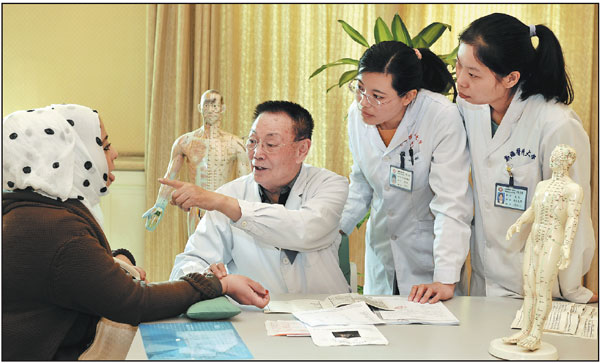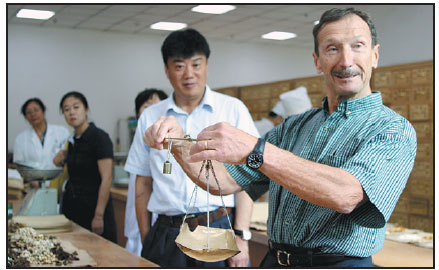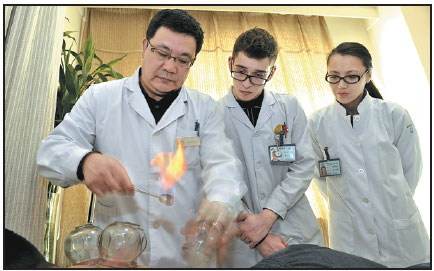TCM prompts more visits from the neighbors
A growing number of people from nearby countries and further afield are venturing to China for treatment. Zhao Xinying, Aybek Askhar and Mao Weihua report from Urumqi, Xinjiang Uygur autonomous region.
Editor's note: This is the third in a series of stories focusing on the Xinjiang Uygur autonomous region, looking at developments in the economy, the cultural and business sectors, and poverty alleviation measures.
For the past decade, Gabidin Khalinov has visited Urumqi, capital of the Xinjiang Uygur autonomous region, at least once a year for a physical examination.
Born in 1993, the young Kazakhstan native was diagnosed with leukemia when he was 5 years old.
However, medical services in his country were not developed enough to cure his disease, so local doctors suggested that he should travel to Germany, Japan or Xinjiang for treatment.
"It was too far and too expensive to seek treatment in Germany or Japan, so my family chose the last option and brought me to Urumqi in 2002," Khalinov recalled.
At the Hospital of Traditional Chinese Medicine of the Xinjiang Uygur autonomous region, one of the region's best public medical institutions, he started a long-term battle against the disease with a combined therapy of TCM and Western medicine.
"The disease was controlled after five years, and I only needed to have regular examinations afterward," said Khalinov, who lives in Nur-Sultan, Kazakhstan's capital.
"Recently, my doctors in Urumqi told me that there's no need to come any more because I am cured."
He is just one of thousands of people from overseas who consult TCM practitioners in Xinjiang every year.
In the past four years, at least 20,000 non-Chinese have sought medical treatment in the five public hospitals in the region that provide services for international patients, according to the Health Commission of the Xinjiang Uygur autonomous region.
Most came from Central Asian countries such as Kazakhstan, Tajikistan and Kyrgyzstan, which border China through Xinjiang, the commission said.
Located in the far west, Xinjiang borders eight countries - the largest number among all of China's provinces and regions - and has been recognized as a core area of the Silk Road Economic Belt since the Belt and Road Initiative was proposed in 2013.
As a result of Xinjiang's location and relatively high level of medical expertise, local authorities have worked to build the region into an international medical service center for neighboring countries.
Advantages
Zhang Li is director of the healthcare center at the First Affiliated Hospital of Xinjiang Medical University in Urumqi, which is responsible for the reception of foreign patients.
She said the region's medical institutions have long been good choices for patients from neighboring countries because they are close to their homes and provide effective, relatively inexpensive healthcare.
"Language and culture are further attractions," she said. "Some of our doctors are members of the Kazakh ethnic group and are able to communicate directly with patients from Kazakhstan, our biggest source of international patients."
Patients from other nearby countries also find it easy to locate interpreters in Xinjiang, she added.
"Also, Xinjiang's culture shares quite a lot of similarities with those in countries around Central Asia, which means patients and their families become accustomed to life here faster than if they seek treatment in other places," she said.
Muhammad Shmin, a Tajikistan native whose kidney failure was cured by a transplant at the First Affiliated Hospital, said one of the factors that prompted him to seek treatment in Xinjiang was the state-of-the-art equipment and the doctors' skills.
The customs officer, who lives in a small city near Dushanbe, Tajikistan's capital, was diagnosed with uremia - urea in the bloodstream - about a decade ago.
Neither the hospitals in his hometown or in Dushanbe were advanced enough to offer a kidney transplant or dialysis, an essential procedure for patients with malfunctioning kidneys. In response, he turned to medical institutions in Xinjiang, which offered both treatments.
He said consulting doctors in Xinjiang is convenient and eases his feelings of homesickness.
"The region is close to my home country," the 50-year-old said. "The food here is similar to what I eat at home and the cost is reasonable and acceptable, so it doesn't add to my financial burden."
Wang Xiaomin, the doctor in charge of the reception and triage of overseas patients at the People's Hospital of Xinjiang Uygur autonomous region, said non-Chinese receive the same high-quality medical services as local residents and at the same cost, which means treatment is easily affordable.
"Some hospitals like ours have even set up 'green channels' for these patients, making the process for them to consult doctors more simple, efficient and pleasant," she said.
Good results
Halip Abula, director of the Department of Traditional Chinese Medicine at the People's Hospital, said many patients from neighboring countries come to be treated for dermatological, orthopedic and respiratory conditions, which are common in those countries.
"TCM has a very good effect on treating these conditions, which appeals to lots of patients," he said.
Zhou Mingxin, a nationally renowned TCM expert at the Hospital of Traditional Chinese Medicine of the Xinjiang Uygur autonomous region, remembered a patient from Kazakhstan, who came to see him in 2017 for treatment of menstrual cramps.
"Western therapy in her country was ineffective, so she turned to me under the recommendation of her Chinese friends," Zhou recalled.
After conducting the "four steps" of TCM diagnosis - look, listen, question and take the pulse - Zhou concluded that the patient's uterus had "caught a cold" after she swam in cold water during her period. That had led to stasis, which made it difficult for the blood in her uterus to flow out smoothly, causing pain.
Zhou prescribed a number of herbs for the patient and taught her how to make the medicine back home in Kazakhstan. He also asked her to visit him every month to make alterations to the prescription in accordance with the development of the condition.
"For about half a year, she came to see me every month. During that time, her menstrual cramps eased gradually and after six months, the pain had vanished, so she didn't need to come any more."
Zhou was particularly impressed by the case because it helped him to realize that sometimes TCM has better effects on patients from overseas.
"Many patients from other countries are more sensitive to herbs, possibly because they tend to eat more meat and use fewer herbs than Chinese people," he said.
Lu Chen, vice-president of the People's Hospital, one of the best in the region, said that although patients from overseas receive medical services at the same cost as local people, they are not reimbursed in the same way as Chinese patients because medical services in Xinjiang have yet to be connected to the international medical insurance system.
Liu Hongxia, a leading dermatologist at the Hospital of Traditional Chinese Medicine of the Xinjiang Uygur autonomous region, said that in light of that fact, some TCM therapies are especially well-received by patients from overseas because they are relatively inexpensive.
"For example, an effective TCM therapy for psoriasis, a skin condition that is common among patients from Central Asia, consists of guasha (a popular treatment where the patient's neck, chest or back is scraped) and bahuoguan (fire cupping). The entire treatment costs just 30 yuan ($4.50) or so per session," she said.
Online consultation
Duan Yan, deputy director of the Remote Medicine Department at Lu's hospital, said that in addition to providing offline medical services, some hospitals in Xinjiang are trying to expand their scope by setting up transnational medical platforms.
That will allow top experts to offer suggestions, guidance and help for doctors in Central Asian countries via the internet.
"Last year, using this approach, doctors from our hospital offered key advice on the treatment of a woman with a tumor in Kazakhstan, who was unable to visit a doctor in Urumqi," she said, adding that she and her colleagues hope to help more patients from neighboring countries in the future.
Zhang Li, from the hospital affiliated to Xinjiang Medical University, said her institution is working on a platform that will combine online consultations and offline medical services.
A "cloud hospital" transnational medical service network that will connect large hospitals in neighboring countries is also being established, she said.
Contact the writers at zhaoxinying@chinadaily.com.cn
|
Jin Hongyuan (second from left), a TCM practitioner at the Hospital of Traditional Chinese Medicine of the Xinjiang Uygur autonomous region in Urumqi, examines a patient from Kazakhstan. Li Peng / For China Daily |
|
Rolf Martin Zinkernagel (right), joint winner of the 1996 Nobel Prize in Physiology or Medicine, visits the hospital. |
|
Ma Zhong (left), an acupuncturist at the hospital, demonstrates cupping therapy to foreign students. |
(China Daily Global 04/25/2019 page5)





















